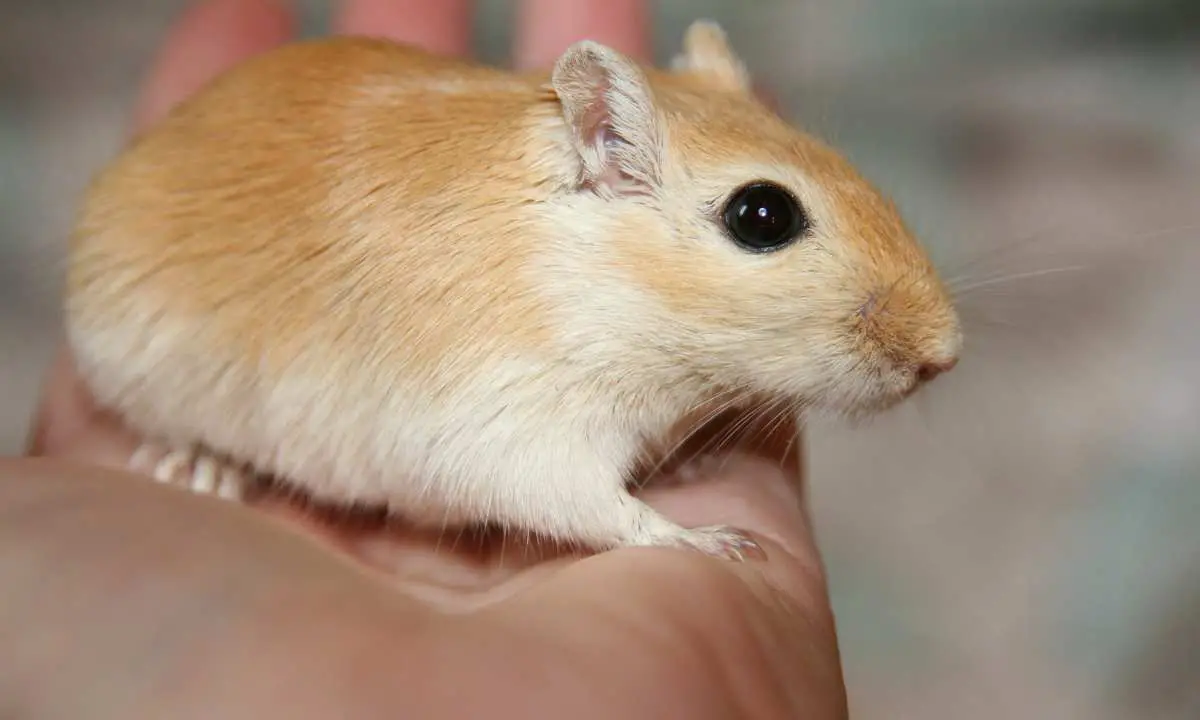Gerbils make great pet rodents because they are known to be very friendly and interactive creatures. They are also fairly low maintenance, requiring only basic care. If you are considering a new pet, then a gerbil could be an excellent choice as they can help provide companionship, amusement, and activity in your home.
Gerbils have become increasingly popular pets over the years with more people realizing their unique benefits. Though originally from the desert, gerbils have adapted well to living in captivity, which means that they rarely require much additional care or specialized equipment for their health and happiness. Gerbils can live on average three to four years or longer if given proper care.
A few distinct elements make gerbils different from other small animals and suitable as pets: they’re social animals; they’re typically quite active; they possess an inquisitive nature; and they rarely bite humans or display aggressive behavior when handled gently. Gerbils also enjoy being around humans which makes them great companions without needing a large amount of physical space or energy input from their owners like cats or dogs do. Furthermore, since gerbils require so few resources to remain healthy it makes them ideal as first-time animal companions for younger children who are still learning responsibility through caring for others.
Table of Contents
Gerbil Characteristics
From their small size to the fun antics they are known for, gerbils are quickly becoming one of the most popular small pets. Before deciding to get a gerbil as a pet, it is important to understand some of the key traits and characteristics they have.
In this article, we will be discussing some of the benefits of owning a gerbil and why they make great pets.
Appearance
Gerbils are small rodents that measure about 6-9 inches (15-23 centimeters) in length, including the tail. Although their tails can vary slightly in length, they are often as long or longer than the body itself. Their fur is typically mottled yellowish-brown on top with a white underside and they have small ears, eyes, and noses on their heads. Gerbils have incredibly soft fur and are often described as being very “furry.” Many pet gerbils also have unique patterns of white markings along their backs.
Despite their relatively small size, gerbils are surprisingly strong and agile animals. They have slender bodies that enable them to move quickly and also feature specialized hind legs with large feet which aid them in jumping distances up to three feet high (91 cm). Gerbils’ front paws are used for digging and pushing objects around. Additionally, gerbils can produce a variety of tones including buzzes, clicks, squeaks, chirps, shrieks, and whines to communicate with each other.
Temperament
When it comes to pet ownership, temperament is an important factor. Gerbils are usually calm, docile and easy-going. They even rarely bite and typically move about their cages in a peaceful manner. Additionally, gerbils can be easily trained to come to their owners when called or given treats. Gerbils don’t require a lot of interaction with their owners but still enjoy spending time interacting with them when they can.
One additional pro of owning gerbils is that they make good group pets since they socialize well with other gerbils of the same species which means you don’t need to keep just one on its own if you don’t want to.
On top of being generally calm animals, gerbils have some more specific characteristics that make them great pets for those who appreciate them. For example, gerbils have excellent vision and hearing, enabling them to easily pick up on small details in their environment – especially foods! They also have very keen senses of smell; this helps them explore new things without putting themselves in any danger or getting lost in unfamiliar places due to disorientation from the sudden change of scents. And though gerbils are nocturnal animals by nature, their bodies still adjust quite well when kept on regular schedules during daylight hours which makes it easier for owners who cannot stay up late at night to take care of them properly.
Diet
Gerbils are omnivores, meaning they will eat both plant and animal-based foods. If you feed your pet gerbil commercially produced feed, it is important to select a good quality food designed specifically for gerbils. Look for a mix that contains a variety of small grains, nuts, seeds, and other goodies that your gerbil will enjoy.
In addition to commercial feeds, you can offer your gerbil a wide variety of healthy treats such as fruits and vegetables. These should be offered in small amounts as part of their regular diet. Some favored treats may include apples, carrots, broccoli, and sweet potatoes. Gerbils enjoy crunchy food items so consider feeding crunchy cereals or germinated grains like quinoa or wheat germ. Occasional treats also can be provided if they are within the gerbil’s dietary plan. Insects like mealworms are an excellent treat as they provide valuable protein vitamins and minerals not typically found in most commercial feeds.
Although gerbils need carbohydrates to thrive (about 80% of the total diet), they shouldn’t make up more than half of their daily meal intake because too many carbs can cause diabetes-like complications in them such as weight gain and lethargy-related issues. Without enough nutrients from fruits and vegetables, an unbalanced diet may lead to nutritional deficiencies that could affect their overall health. As an owner, it is very important to monitor the nutrition content of your pet’s foods to ensure he is getting all the vitamins he needs for optimum health.
Lifespan
Gerbils have an average lifespan of three to four years though some may live longer. With proper care, gerbils can live a long and healthy life, although their age can increase the chance of developing particular illnesses or medical conditions. Gerbils should always be bought from a pet store, breeder, or rescue center. This helps reduce the risk of disease and ensures that you get a good-quality animal that will live as long as possible.
Unlike other rodents, gerbils are not prone to overeating and are generally very healthy animals. They are also very active and require daily exercise which will help them stay in shape for a longer period of time. They do not need regular vaccinations but should be checked over by a veterinarian annually to help ensure they remain healthy and provide an opportunity for early diagnosis of any problems.
Age can also depend on diet and environment – gerbils need plenty of fresh food, clean water, and appropriate living space with an adequate amount of ventilation to thrive. Any signs or symptoms that suggest illness (lethargy, loss of appetite) should be reported to your veterinarian immediately so that measures can be taken to ensure optimal health for your pet gerbil. Overall taking the best care of your pet will make sure its lifespan reaches its potential.

Benefits of Owning Gerbils
When considering what kind of pet you should get, you may want to consider getting gerbils. Gerbils are not only cute and furry, they are also full of personality and are easy to take care of. Not to mention, they have a number of advantages that make them great pets.
In this article, we will explore all of the wonderful benefits of owning gerbils.
Recommended: easy pets to take care of
Low Maintenance
Gerbils are a great option for pet owners who don’t want to invest a lot of time in caring for their pet. With the combined benefit of being inquisitive and clean, gerbils need little from their owner and it’s easy to keep them healthy and happy.
For starters, they don’t require a lot of space so they’re ideal for people living in apartments or those who don’t have access to an outdoor area. A single gerbil should have at least five gallons of space in its cage, but if you opt for two or more you’ll only need 10 gallons of room. The size can depend on how active your gerbil is — the bigger the habitat, the more opportunities your gerbil will have to be active and explore his environment.
In terms of accessories, all you really need is some bedding (often made from recycled paper or aspen shavings), a water bottle (preferably one with no leaks) and some toy blocks (which your gerbil can use to build tunnels). Your gerbil may also enjoy purchasing something called “Gnaw Sticks”. These are small logs that are usually made from apple branches which provide entertainment as well as nutritional value.
When it comes to feeding time, food (such as specially formulated pellets) won’t need to be purchased too often since they tend to eat very little food per day. As an added bonus, Gerbils like variety so buy different snacks whenever possible. You can also introduce some healthier snacks such as plain popcorn, unsalted nuts and fish flakes – all perfect when it comes to providing them with much-needed calcium!
Low Cost
The cost of owning a gerbil is relatively low compared to other pets, making it a great choice for those on a budget. A gerbil’s diet consists mostly of pellets, which are relatively inexpensive. In addition, gerbils do not require a particular type of housing, so you can opt for simpler and cheaper options such as aquariums or terrariums.
Gerbils also don’t require additional expenses such as trips to the vet that other animals may need. As with any pet, you should always make sure your gerbil get the nutrition it needs by offering plenty of fresh fruits and vegetables along with its pellets. You should also encourage regular exercise to help keep them happy and healthy – but this can be done easily at home without additional costs.
Easy to Care For
Gerbils are small, friendly rodents that make great companions in households of all sizes. They are easy to care for, require minimal space, and can provide hours of entertainment. Here are some of the benefits of owning Gerbils:
-Gerbils are very simple to look after; they need a cage, dry food, and a supply of clean water.
-A gerbil’s diet is comprised mainly of high-quality pellets supplemented with fresh fruits and vegetables. No special diets or supplements are necessary.
-Gerbils don’t need significant amounts of exercise so their cages can be smaller than those required for other rodents like guinea pigs and rabbits.
-Gerbils require little grooming; simply brushing them once or twice a week will do the trick!
-With proper care, gerbils can live for up to five years; this makes them great pets for children as well as adults who want to start a family pet without making a long-term commitment.
-These friendly creatures usually appreciate the human interaction and often learn their owners’ names over time!
Social
Gerbils are highly social animals, and it is recommended that you buy at least two. Gerbils housed in pairs will often bond and provide each other with companionship, but there is a possibility that some squabbling may occur. If this happens, consider adding another gerbil to the pair to shift the dynamics in the cage. When considering adding more than one gerbil to a household, be sure they are all of the same genders to avoid unexpected pregnancies.
Gerbils can also be tamed easily with regular handling as they adapt quickly and will recognize their owners soon after regular interactions begin. Breeders suggest introducing your children carefully to hand-tamed gerbils as they may be extra sensitive for safety reasons.
Your gerbil should feel safe around you so do not overhandle or stress them out. Typically, these social animals enjoy roaming around their owner’s hands and playing with people in a light-hearted manner, but again make sure your interactions are calming and purposeful – never become too rough or place them too high up from the ground since falling can cause major physical damage to them! It’s important to get on their level during playtime as that will help ensure comfort for both parties involved!
Conclusion
In conclusion, it’s easy to see why gerbils are great pets. They require minimal effort and can provide hours of entertainment. Gerbils are social animals who enjoy interacting with one another and their owner, and they’re highly intelligent animals that can learn a variety of tricks with patience and consistency.
When kept in a clean, well-ventilated environment, gerbils have been known to live up to five years or more. For these reasons and more, gerbils are a great pet to consider owning.



